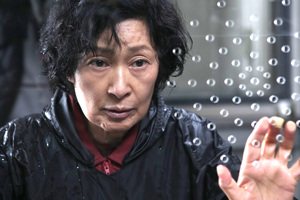South Korean film finds humor in cruelty
Mothers are strange beasts. Their relationships with their children are far more complex and imperfect than most realize until they are parents themselves. Some women come to hate their children while others, like the older lady at the center of director Joon-ho Bong’s Mother, develop an unhealthy obsession with their offspring.

Unbroken bond · Kim Hye-ja plays an obsessive mother who will do anything to prove the innocence of her mentally disabled son. - Photos courtesy of Magnolia Pictures
Bong’s first South Korean feature since his delightful 2006 monster movie The Host studies the lengths some women will go to in order to preserve the image that their children are perfect. The titular protagonist’s son is mentally challenged (in his late 20s but possessing a child’s mind) and when he is accused of murdering a local girl, his doting mother takes on the handle of amateur detective to try to prove his innocence.
In tone, Mother is a spiritual sequel to Bong’s Memories of Murder — a 2003 masterpiece about an inept, small-town cop’s relentless search for South Korea’s most notorious serial killer. There, and in Mother, Bong mixes a serious plot about murder in a country town with a bizarre and well-placed sense of humor.
Mother finds a lot of comedy in the rural bureaucracy and the strange and cruel tactics local police use against the accused. Bong’s twisted sense of humor is the most shocking and wonderful aspect of his films, and the ways he induces the audience to giggle in Mother serves as an important counterpoint to the deadly serious subject matter. For the director, life can be cruel and tragic but only because people behave so absurdly.
But Mother is still Bong’s most serious film, and in the end his least satiric. The mother’s search for evidence leads her in far over her head, and by the time she nears the solution to the plot’s puzzles she has uncovered some of the darker elements of society — and of her own personality.
Like his previous films, Bong fills his movie’s pallet with a number of tragicomic ancillary characters. The story of the murdered girl unfolds alongside the mother’s search for evidence to clear her son’s name, and Bong creates a truly tragic story within a story about poverty. There is also the son’s thug friend, played coolly by Yoon Jae-moon, who aids the mother in a brutal interrogation of some potential witnesses and reveals a career goal that serves as one of the movie’s most poignant little laughs.
The weakest part of Mother is the son, whose mental handicap often feels more like a plot device. Won Bin does well in the part, but the character is flawed on the screenplay level. Bong has written mentally challenged characters into each of his films — and it is to his credit that he never romanticized conditions in the same way that Hollywood does — but in Mother the son is granted moments of clarity and releases from his handicap that merely serve to reveal important plot points at crucial moments.
The anchor of the film, appropriately, is Kim Hye-ja’s turn as the mother. Hye-ja turns an emotionally incomprehensible character into a unique heroine — we cannot understand the extent of her devotion to her son, but as it drives her deeper and deeper into a mystery she becomes strangely sympathetic. The film’s emotional centerpiece is a conversation between mother and incarcerated son — which passes through the great cinematic barrier of a glass-separated visitation room — delivered by Hye-ja and Bin with great power.
Cinematographer Hong Kyung-Pyo effectively mimics the style of Bong’s first two films, transforming the damp and expansive rural landscape into an important character in its own right. Open fields and beautiful forests seem to swallow the characters up, and the whole film carries an air of mystery and melancholy in the way it looks.
Mother is Bong’s most personal film. The last 30 minutes deliver a punch in the gut that, sadly, the film just might not earn. Bong hid aces up his sleeve in the service of a good mystery, and the end of the mother’s journey loses some poignancy for it. The proceedings are saved by Hye-ja, who brings her character’s arc to its logical conclusion with true grace. The difficult decisions the mother makes in order to save her son — and the aftereffects of those actions on her psyche — are perfectly rendered by the performer and captured against the wonderful visuals.
Mother is a flawed mystery but a near-perfect character study. Like a noir, the solution to the crime becomes secondary to the depths that the investigation takes the detective. To the credit of the director and his star, Mother is an emotionally-shattering film: serious and funny in all the right places and bolstered by a truly magnificent performance.

This was a real oddball movie; I watched it at the SCE building–awesome little movie theatre–thanks George Lucas. I really like the direction of contemporary Korean movies such as these. They’re raw. I doubt the S. Korean audience likes this style.